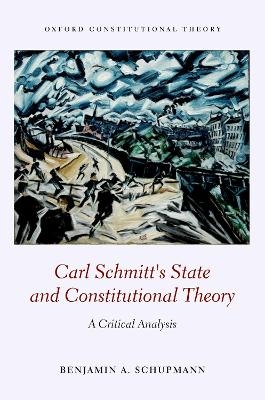
Carl Schmitt's State and Constitutional Theory
A Critical Analysis
Seiten
2017
Oxford University Press (Verlag)
978-0-19-879161-4 (ISBN)
Oxford University Press (Verlag)
978-0-19-879161-4 (ISBN)
Schupmann appraises Schmitt's constitutional theory and examines how it was conceived in response to the Weimar Germany's legitimation crisis. Schmitt's normative theory of 'constrained' democracy offers a novel way to understand the legitimacy of liberal democracy and the limits of constitutional change, and is today more relevant than ever.
Can a constitutional democracy commit suicide? Can an illiberal antidemocratic party legitimately obtain power through democratic elections and amend liberalism and democracy out of the constitution entirely? In Weimar Germany, these theoretical questions were both practically and existentially relevant. By 1932, the Nazi and Communist parties combined held a majority of seats in parliament. Neither accepted the legitimacy of liberal democracy. Their only reason for participating democratically was to amend the constitution out of existence.
This book analyses Carl Schmitt's state and constitutional theory and shows how it was conceived in response to the Weimar crisis. Right-wing and left-wing political extremists recognized that a path to legal revolution lay in the Weimar constitution's combination of democratic procedures, total neutrality toward political goals, and positive law. Schmitt's writings sought to address the unique problems posed by mass democracy. Schmitt's thought anticipated 'constrained' or 'militant' democracy, a type of constitution that guards against subversive expressions of popular sovereignty and whose mechanisms include the entrenchment of basic constitutional commitments and party bans.
Schmitt's state and constitutional theory remains important: the problems he identified continue to exist within liberal democratic states. Schmitt offers democrats today a novel way to understand the legitimacy of liberal democracy and the limits of constitutional change.
Can a constitutional democracy commit suicide? Can an illiberal antidemocratic party legitimately obtain power through democratic elections and amend liberalism and democracy out of the constitution entirely? In Weimar Germany, these theoretical questions were both practically and existentially relevant. By 1932, the Nazi and Communist parties combined held a majority of seats in parliament. Neither accepted the legitimacy of liberal democracy. Their only reason for participating democratically was to amend the constitution out of existence.
This book analyses Carl Schmitt's state and constitutional theory and shows how it was conceived in response to the Weimar crisis. Right-wing and left-wing political extremists recognized that a path to legal revolution lay in the Weimar constitution's combination of democratic procedures, total neutrality toward political goals, and positive law. Schmitt's writings sought to address the unique problems posed by mass democracy. Schmitt's thought anticipated 'constrained' or 'militant' democracy, a type of constitution that guards against subversive expressions of popular sovereignty and whose mechanisms include the entrenchment of basic constitutional commitments and party bans.
Schmitt's state and constitutional theory remains important: the problems he identified continue to exist within liberal democratic states. Schmitt offers democrats today a novel way to understand the legitimacy of liberal democracy and the limits of constitutional change.
Benjamin A. Schupmann is a lecturer in Philosophy, Politics, and Economics in the Division of Social Sciences at Yale-NUS. His research interests include the history of political thought, state and constitutional theory, constitutionalism, and 20th-century German political and legal thought.
Introduction: Constitutionality and the Weimar Crisis
1: The Challenge of Mass Democracy
2: The Concept of the Political
3: The Absolute State
4: The Absolute Constitution
5: The Guardian of the Constitution
6: Basic Rights
Conclusion: Carl Schmitt and Constrained Democracy
| Erscheinungsdatum | 15.03.2018 |
|---|---|
| Reihe/Serie | Oxford Constitutional Theory |
| Verlagsort | Oxford |
| Sprache | englisch |
| Maße | 164 x 240 mm |
| Gewicht | 542 g |
| Themenwelt | Recht / Steuern ► Allgemeines / Lexika |
| Recht / Steuern ► EU / Internationales Recht | |
| Recht / Steuern ► Öffentliches Recht | |
| Recht / Steuern ► Rechtsgeschichte | |
| Sozialwissenschaften ► Politik / Verwaltung ► Politische Theorie | |
| ISBN-10 | 0-19-879161-5 / 0198791615 |
| ISBN-13 | 978-0-19-879161-4 / 9780198791614 |
| Zustand | Neuware |
| Haben Sie eine Frage zum Produkt? |
Mehr entdecken
aus dem Bereich
aus dem Bereich
ein Vortrag
Buch | Softcover (2024)
Suhrkamp (Verlag)
10,00 €
Buch | Softcover (2024)
Mohr Siebeck (Verlag)
39,00 €


